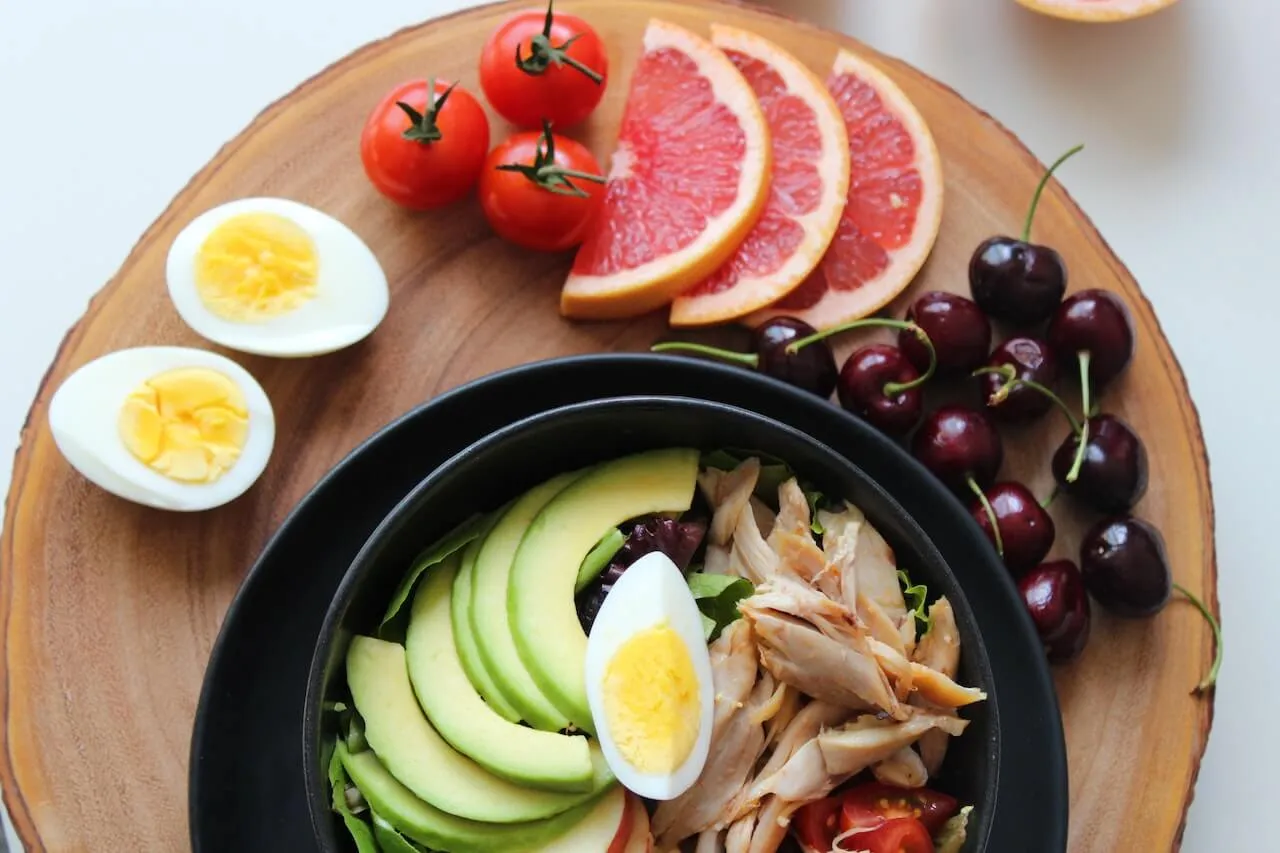Eat breakfast like a king, lunch like a prince, and dinner like a pauper for a healthy life, right? It is old advice, but it isn’t far off the mark.
Starting your day with a healthy breakfast makes you feel like royalty and may also benefit your overall health. And guess what? Your heart might just love it too!
According to the American Heart Association's Scientific Statement from 2017, regularly eating breakfast can do wonders for your health.1 It may help you keep your weight in check, and lower total cholesterol, LDL cholesterol, and blood pressure levels.2 Plus, it may help support healthy blood glucose and insulin levels.3
To help get your day off to a good start, we’ll review some healthy breakfast ideas and tips for how to eat a good breakfast, even when you are busy.
What are Heart-Healthy Meals?
Heart-healthy meals are lower in saturated fat and sodium than the traditional American diet and contain fruits, vegetables, whole grains, and lean protein options. Meals are focused on lowering total cholesterol levels and bad cholesterol levels that increase the risk for cardiovascular disease and reduce high blood pressure.4
What is the Cardiac Diet?
A “cardiac diet” is honestly just another term for a heart-healthy diet. It is recommended to help people with heart disease reduce their risk by eating healthy food and exercising regularly. Some common foods encouraged on a heart-healthy diet include eating various fruits and vegetables, whole grains, and beans. Adding foods rich in healthy fats, like seafood, nuts, seeds, and healthy oils, is also encouraged.
These foods have been shown to help reduce LDL cholesterol and triglyceride levels and help your overall metabolic health. The cardiac or heart-healthy diet also suggests reducing higher sodium foods, fried foods, and foods with a lot of added sugar.
{{mid-cta}}
1. Avocado Toast on Whole-grain Bread
This trendy breakfast has had some staying power for a good reason. It’s quick to make, has healthy fat and whole grains, and you can add some veggies, an egg, or a bit of crumbled feta cheese for extra protein. Plus, bring all the pieces with you, and you can assemble them at your desk while you tackle your morning emails.
2. Oatmeal with Berries and Low Fat Milk
Nothing is better than a hearty bowl of oatmeal with beautiful fresh berries to get your morning off to a good start. Top it with some low-fat milk for protein, calcium, and vitamin D, and add some sliced kiwi for a little tropical flavor. This recipe is perfect for a chilly spring morning!
3. Spinach Omelet Breakfast Sandwich
The beauty of this breakfast sandwich is that you can make the omelet ahead and freeze it. Then just pull it out, reheat it, and add it to a toasted whole-grain English muffin.
To make the omelet, break two eggs in a bowl and whisk them together until light and fluffy. Add chopped fresh baby spinach, diced onions, salt, and pepper to the eggs and mix them.
Heat a non-stick skillet over medium heat. Grease two 4-inch round egg forms. Set the rounds in the skillet to heat. Pour the egg mixture into the rounds and cook for two to three minutes, until the egg mixture starts to firm up. Then gently remove the form and flip the egg over to cook through. Alternately, skip the forms and pour the egg mixture into a skillet and cook it for two to three minutes and then flip it. Once done, cut it in half and place each half on a toasted English muffin.
4. Hummus, Veggies, and Microgreens Toast
Similar to avocado toast, this hummus toast is a hearty breakfast. It is full of heart-healthy fiber and good fats, and leafy greens. This open-faced sandwich will keep you going all morning long.
All you need is one slice of 100% whole grain bread, ¼ cup hummus, a couple of slices of tomatoes and red onions, and ½ cup arugula. Toast the bread until both sides are brown and crisp. Spread the bread with the hummus and top it with the vegetables.
5. Poached Eggs over Spinach and Whole Wheat Sourdough Bread
Eggs make an easy breakfast, and poaching or hard boiling them helps keep the fat content down. In this easy breakfast, we’ve got poached eggs over spinach on a hearty piece of whole wheat sourdough bread.
To poach an egg, the Food Network recommends heating about two inches of water in a large skillet and adding a little vinegar to the water to help the eggs set. Then crack the eggs into individual bowls or cups and gently place the egg in the boiling water. Let them cook for about four minutes, and gently scoop them out. You’ll have a perfectly poached egg. Place it on a bed of spinach on top of a piece of crusty bread, and you are off to a great start!
6. Breakfast Burrito
Fill a whole wheat tortilla with scrambled eggs, black beans, diced tomatoes, corn, and onions, and you have a hearty breakfast in no time. Just wrap it up and head out the door. To prep this dish ahead of time, mix up the beans, corn, tomato, and onions the night before. Add a little chili powder and cumin, and let it sit in the fridge overnight. In the morning, scramble up some eggs, place them in the tortillas, and top with some of the bean and corn mix. Wrap it up and go!
7. Pomegranate Smoothie
Whip together 1 cup of silken tofu, ¼ cup of pomegranate juice, and ¼ cup of frozen pomegranate seeds. Blend on high. Add a couple of ice cubes if the mixture is too thick.
8. Overnight Oats
Overnight oats are a delicious and filling make-ahead breakfast. Everything from berries to apples, peanut butter to walnuts, and more make this a great choice. This easy breakfast recipe uses ½ old fashioned oats combined with 2 Tbsp. almond butter thinned with ½ cup of almond milk, ½ cup of shredded apples, and ¼ tsp. of cinnamon. Mix them together and place them in a 12 oz jar covered in the fridge. They will be ready to eat in six to eight hours.
9. Cottage Cheese and Fruit
Cottage cheese is back! It’s true; it is the new “it” food, and why not? This creamy, mild cheese dish has 14 grams of protein in just a ½ cup which will help keep you feeling full all morning. It is also full of B vitamins and phosphorus and contains about five percent of the daily value of calcium.
And what could be easier? Place ½ cup of cottage cheese in a bowl and top it with a mix of fresh berries and a drizzle of honey if you want to sweeten it up a bit.
10. Smoothie Bowl with Berries and Chia
What can be easier than a delicious, deconstructed smoothie? Just place some vanilla yogurt in a bowl, and top it with mixed berries, chopped walnuts, and a tablespoon of chia seeds for a heart-healthy, brain-boosting breakfast.
11. Peanut Butter and Banana Toast
Thanks to its monounsaturated fat content, peanut butter is a great choice for a heart-healthy breakfast. It is also packed with vitamin E, iron, and potassium and is a good source of protein. Remember, it is a high-calorie option, so a little can go a long way. Just two tablespoons have about 100 calories, 7 g of protein, and 1.5g of fiber. Spread that on a piece of whole grain toast and top it with sliced banana for a filling and heart-healthy breakfast.
12. Veggie Scrambled Eggs
Wanting to stick with a plant-based diet but missing your eggs in the morning? This healthy vegan tofu scramble will satisfy that craving and is super easy to make. Start by crumbling a block of firm tofu up into a bowl. You can drain it but don’t need to press it; the extra moisture helps it.
Then, heat a little grapeseed or avocado oil in a pan. Add some diced onion to the pan and cook it for three to four minutes until it becomes translucent. Add the tofu and cook it for about five minutes, stirring it and mashing it with a fork as you cook it. Sprinkle a little turmeric and garlic powder over the top and mix it well. The turmeric gives it the eggy, yellow color, but if you aren’t a fan, skip it! Serve it on an English muffin over fresh baby spinach and top with sauteed mushrooms.
13. Southwestern Scramble
Amped-up scrambled eggs for when you have a little extra time. These eggs are scrambled with canned or frozen sweet corn, sliced mushrooms, and red peppers. You can sprinkle in a little spicy chili powder if you like a little kick. Once they are cooked, top them with some fresh cilantro and serve with crusty bread and fresh avocado.
14. Healthy Banana Bread
Go ahead and make your regular banana bread recipe; just swap whole wheat pastry flour for regular all-purpose flour to amp up the fiber content. Add in some chopped walnuts for a boost of heart-healthy omega-3s. Banana bread is great quick bread and breakfast choice. The bananas add moisture and sweetness and often replace some of the fat and sugar that you'd find in other quick bread.
15. Blueberry Lemon Oatmeal Parfaits
This breakfast just feels like spring. Combining blueberries and lemon is a fresh way to start your day. Place ¼ cup of muesli in the bottom of a bowl to make these delicious parfaits. Top it with 1 cup of lemon-flavored Greek yogurt, ¼ cup of blueberries, and a couple of tablespoons of chopped nuts. Sprinkle it with a little more muesli and dive in.
Benefits of Eating a Heart-Healthy Breakfast
Starting your day with a heart-healthy breakfast is a great way to kick-start your day. Whether you eat as soon as you wake up or an hour or two after rising, there are many benefits associated with eating a healthy breakfast, including:
- Reducing the temptation for unplanned snacking throughout the day.
- May reduce the risk of heart disease
- Can help you feel more energized
- May help with your mood
- May help with weight loss
- May help keep your blood sugar stable
Using a CGM with Signos: Real-Time Data, Backed by AI
Signos pairs a round-the-clock glucose biosensor with AI trained on tens of millions of data points to deliver personalized, science-backed guidance for weight management and health. See exactly how your body responds, and take action.
Learn how it works. Ready to get started? Join now.
Topics discussed in this article:
References
- St-Onge, M. P., Ard, J., Baskin, M. L., Chiuve, S. E., Johnson, H. M., Kris-Etherton, P., Varady, K., & American Heart Association Obesity Committee of the Council on Lifestyle and Cardiometabolic Health; Council on Cardiovascular Disease in the Young; Council on Clinical Cardiology; and Stroke Council (2017). Meal Timing and Frequency: Implications for Cardiovascular Disease Prevention: A Scientific Statement From the American Heart Association. Circulation, 135(9), e96–e121. https://doi.org/10.1161/CIR.0000000000000476
- Cahill, L. E., Chiuve, S. E., Mekary, R. A., Jensen, M. K., Flint, A. J., Hu, F. B., & Rimm, E. B. (2013). Prospective study of breakfast eating and incident coronary heart disease in a cohort of male US health professionals. Circulation, 128(4), 337–343. https://doi.org/10.1161/CIRCULATIONAHA.113.001474
- Maki, K. C., Phillips-Eakley, A. K., & Smith, K. N. (2016). The Effects of Breakfast Consumption and Composition on Metabolic Wellness with a Focus on Carbohydrate Metabolism. Advances in nutrition (Bethesda, Md.), 7(3), 613S–21S. https://doi.org/10.3945/an.115.010314
- The American Heart Association. 2021. The American Heart Association Diet and Lifestyle Recommendations. https://www.heart.org/en/healthy-living/healthy-eating/eat-smart/nutrition-basics/aha-diet-and-lifestyle-recommendations Accessed April 12, 2023.
- Miller, V., Mente, A., Dehghan, M., Rangarajan, S., Zhang, X., Swaminathan, S., Dagenais, G., Gupta, R., Mohan, V., Lear, S., Bangdiwala, S. I., Schutte, A. E., Wentzel-Viljoen, E., Avezum, A., Altuntas, Y., Yusoff, K., Ismail, N., Peer, N., Chifamba, J., Diaz, R., … Prospective Urban Rural Epidemiology (PURE) study investigators (2017). Fruit, vegetable, and legume intake, and cardiovascular disease and deaths in 18 countries (PURE): a prospective cohort study. Lancet (London, England), 390(10107), 2037–2049. https://doi.org/10.1016/S0140-6736(17)32253-5
- Aune, D., Giovannucci, E., Boffetta, P., Fadnes, L. T., Keum, N., Norat, T., Greenwood, D. C., Riboli, E., Vatten, L. J., & Tonstad, S. (2017). Fruit and vegetable intake and the risk of cardiovascular disease, total cancer and all-cause mortality-a systematic review and dose-response meta-analysis of prospective studies. International journal of epidemiology, 46(3), 1029–1056. https://doi.org/10.1093/ije/dyw319
- Aune, D., Keum, N., Giovannucci, E., Fadnes, L. T., Boffetta, P., Greenwood, D. C., Tonstad, S., Vatten, L. J., Riboli, E., & Norat, T. (2016). Whole grain consumption and risk of cardiovascular disease, cancer, and all cause and cause specific mortality: systematic review and dose-response meta-analysis of prospective studies. BMJ (Clinical research ed.), 353, i2716. https://doi.org/10.1136/bmj.i2716
- Drouin-Chartier, J. P., Chen, S., Li, Y., Schwab, A. L., Stampfer, M. J., Sacks, F. M., Rosner, B., Willett, W. C., Hu, F. B., & Bhupathiraju, S. N. (2020). Egg consumption and risk of cardiovascular disease: three large prospective US cohort studies, systematic review, and updated meta-analysis. BMJ (Clinical research ed.), 368, m513. https://doi.org/10.1136/bmj.m513
- Blanco Mejia, S., Messina, M., Li, S. S., Viguiliouk, E., Chiavaroli, L., Khan, T. A., Srichaikul, K., Mirrahimi, A., Sievenpiper, J. L., Kris-Etherton, P., & Jenkins, D. J. A. (2019). A Meta-Analysis of 46 Studies Identified by the FDA Demonstrates that Soy Protein Decreases Circulating LDL and Total Cholesterol Concentrations in Adults. The Journal of nutrition, 149(6), 968–981. https://doi.org/10.1093/jn/nxz020



.webp)
.svg)




.webp)





.svg)
.svg)
.svg)
.svg)
.svg)
.svg)
.svg)
